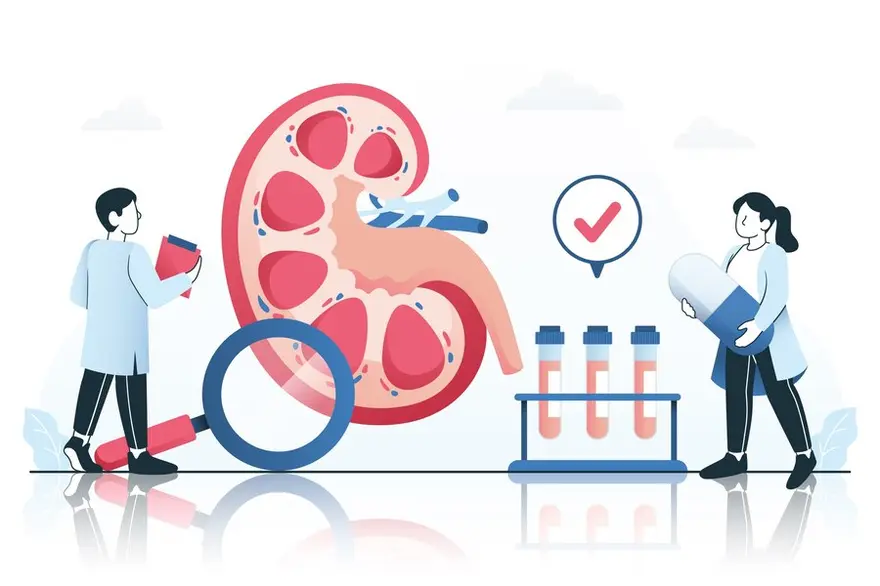Preventive Healthcare
Glomerulonephritis: Causes, Symptoms, Types and Treatment Options
773 Views
0

What is Glomerulonephritis?
Glomerulonephritis is an inflammation of the tiny filtration units in your kidneys known as the glomeruli. These small structures play an essential role in filtering waste products from your blood. When they become damaged due to inflammation or other reasons, the kidneys ability to effectively remove waste from the body becomes compromised.
How do Glomeruli Help Your Kidneys?
In our bodies, we have approximately one million glomeruli! They act like tireless workers, sifting through our blood to remove unwanted waste and excess fluids. The filtered waste ultimately gets excreted from the body as urine. When these filters are damaged, they can cause major health concerns.
Are There Different Types of Glomerulonephritis?
There are primarily two glomerulonephritis types: acute and chronic.
- Acute glomerulonephritis occurs suddenly, often as a response to an infection or due to an overactive immune system. In many cases, this type can resolve without treatment. However, if it persists, an immediate medical intervention is required to prevent lasting damage to your kidneys.
- On the other hand, chronic glomerulonephritis develops gradually over several years and may present very few symptoms until severe kidney damage. While the exact cause of chronic glomerulonephritis isn’t always known, but can sometimes be linked to genetic diseases or specific immune disorders.
What are the Symptoms of Glomerulonephritis?
Recognising glomerulonephritis symptoms can be challenging, especially in chronic cases where the disease may progress silently. However, common symptoms of acute glomerulonephritis include facial puffiness, reduced frequency of urination, dark rusty colored urine due to the presence of blood, coughing due to fluid accumulation in the lungs, and high blood pressure.
In contrast, chronic glomerulonephritis symptoms can include swelling in the ankles and face, needing to urinate often at night, foamy urine from excess protein, abdominal pain, and frequent nosebleeds.
In severe cases leading to kidney failure, you may experience fatigue, loss of appetite, nausea and vomiting, insomnia and muscle cramps at night.
What Causes Glomerulonephritis?
Glomerulonephritis causes are varied, and often linked to immune system disorders, infections, or systemic diseases. Common infections leading to glomerulonephritis include post-streptococcal infections, where symptoms arise after a throat infection. Autoimmune diseases, such as systemic lupus erythematosus and vasculitis, can also result in this inflammation.
Other Glomerulonephritis causes involve viral infections (like HIV and hepatitis), certain medications, or genetic conditions such as Alport syndrome. The inflammation can lead to symptoms such as hematuria (blood in urine), proteinuria (protein in urine), and high blood pressure, potentially resulting in chronic kidney disease if untreated.
What are the Risk Factors for Glomerulonephritis?
Heavy use of nonsteroidal anti-inflammatory drugs, a history of certain infections or immune disorders, and genetic predisposition can all increase your risk of developing glomerulonephritis. It's essential to adhere to the recommended dosage instructions when taking any medication and seek medical advice if needed.
What are the Complications of Glomerulonephritis?
Over time, glomerulonephritis can lead to serious complications including high blood pressure, high cholesterol levels, blood clots, organ damage, chronic kidney disease, or even kidney failure. It is essential to diagnose and manage this condition early to prevent these potential complications.
How is Glomerulonephritis Diagnosed?
Glomerulonephritis is diagnosed through a combination of medical history, physical examination, and specific tests.
- Urinalysis is often the first step, checking for red blood cells, white blood cells, and protein in the urine, which can indicate kidney damage
- Blood tests play a crucial role by measuring waste products to check kidney function and may also reveal antibodies connected to autoimmune diseases or infections
- In certain cases, a kidney biopsy is necessary, This involves taking a small tissue sample to assess the extent of damage and identify the underlying cause of glomerulonephritis
- Imaging tests like ultrasounds are helpful for visualising the structure of the kidneys
Early diagnosis is essential for effective glomerulonephritis treatment and management to prevent additional kidney damage
What is the Treatment for Glomerulonephritis?
Glomerulonephritis treatment varies based on the underlying cause and severity of the condition
- Initial management may involve blood pressure medications, especially angiotensin-converting enzyme (ACE) inhibitors, which help protect kidney function
- Corticosteroids are often prescribed to reduce inflammation, particularly in cases related to autoimmune disorders.
- Additionally, diuretics may be used to eliminate excess fluid and reduce swelling
- Dietary changes are crucial; patients are usually advised to limit their intake of protein, sodium, and potassium to reduce strain on the kidneys
- In more severe cases, treatments like plasmapheresis can be employed to remove harmful antibodies from the blood.
- If kidney function declines significantly, patients may require dialysis or a kidney transplant may be needed
Early intervention is essential to prevent complications and preserve kidney health
Can I Prevent Glomerulonephritis?
While some forms of glomerulonephritis cannot be prevented, there are ways to reduce the risk. Prompt treatment of infections, especially strep throat, is crucial to prevent post-infection glomerulonephritis. Good hygiene, safe sex practices, and avoiding intravenous drug use can help prevent infections that may lead to this condition
Additionally, controlling blood pressure and managing diabetes with a healthy diet and regular exercise can greatly reduce the risk of kidney damage. Maintaining a balanced lifestyle with enough sleep and good nutrition also supports kidney health and may help prevent glomerulonephritis. Regular check-ups with a healthcare provider are important for early detection and management of risk factors
What is the Outlook for People with Glomerulonephritis?
The progression of glomerulonephritis can vary. It might be temporary and reversible or could progressively lead to chronic kidney failure. The outlook largely depends on early diagnosis and effective disease management
How Can I Manage Glomerulonephritis?
Implementing dietary changes, taking prescribed medications, and closely monitoring your condition under a healthcare provider's guidance are essential steps in managing glomerulonephritis
Is Glomerulonephritis a Serious Disease?
Yes, if left untreated, glomerulonephritis can lead to serious complications like kidney failure. Thus, timely diagnosis and treatment are essential
When to See a Doctor?
If you notice symptoms that may indicate glomerulonephritis or have a condition that increases your risk for glomerulonephritis, it’s advisable to consult a healthcare provider
Conclusion
Understanding glomerulonephritis can help you recognise its symptoms, understand its causes, differentiate between types, and explore treatment options. Regular health check-ups and blood tests can play a crucial role in early diagnosis and treatment
In this context, Metropolis Healthcare offers trustworthy diagnostic services right at your doorstep. Their team of experienced technicians collects samples from your home, which are processed at their advanced labs. You can easily access your results online, ensuring every step of your path to wellness is as smooth as possible. With right knowledge and the right support from trusted healthcare providers like Metropolis Healthcare, you can effectively manage your health journey
Remember, prioritising your health is always within reach!























 WhatsApp
WhatsApp
